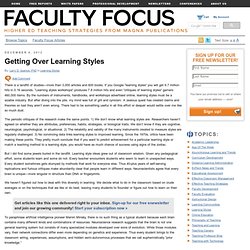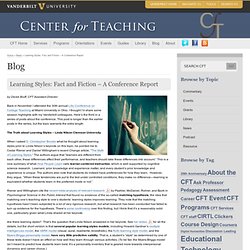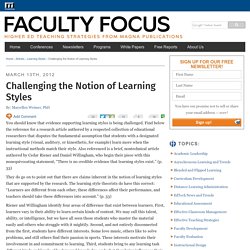

Learning styles and teaching. Learning styles and teaching Submitted by admin on 8 September, 2010 - 10:52 Your students will be more successful if you match your teaching style to their learning styles.

Getting Over Student Learning Styles Theory. December 6, 2012 By: Larry D.

Spence, PhD in Learning Styles There is a landfill of studies—more than 3,000 articles and 600 books. If you Google “learning styles” you will get 9.7 million hits in 0.16 seconds. “Learning styles workshops” produces 7.8 million hits and even “critiques of learning styles” garners 460,000 items. The periodic critiques of the research make the same points. 1) We don’t know what learning styles are. But I did find some jewels buried in the landfill. We haven’t figured out how to deal with this diversity in learning. To paraphrase artificial intelligence pioneer Marvin Minsky, there is no such thing as a typical student because each brain contains many different kinds and combinations of resources. For example: Some students do well by starting with abstractions and working down to the concrete details. Is there a way to cope with this bewildering array of learning options? A bit surprised, I ended up leaving the landfill hopeful.
Recent Trackbacks. Is Teaching to a Student’s “Learning Style” a Bogus Idea? Ken Gibson was an advanced reader in elementary school and easily retained much of what he read.

But when the teacher would stand him up in front of the class to read a report out loud, he floundered. His classmates, he noticed, also had their inconsistencies. Some relished oral presentations but took forever to read a passage on their own; others had a hard time following lectures. Gibson now explains these discrepancies as “learning styles” that differ from one student to the next. He founded a company, LearningRx, on the premise that these styles make a difference in how students learn. The idea that learning styles vary among students has taken off in recent years. There is no shortage of ideas in the professional literature. Frank Coffield, professor of education at the University of London, set out to find commonalities among the many disparate ideas about learning style using a sample comprising 13 models. The premise should be testable, Willingham says.
Is Teaching to a Student’s “Learning Style” a Bogus Idea? Learning Styles: Fact and Fiction – A Conference Report. By Derek Bruff, CFT Assistant Director Back in November I attended the 30th annual Lilly Conference on College Teaching at Miami University in Ohio.

I thought I’d share some session highlights with my Vanderbilt colleagues. Here’s the third in a series of posts about the conference. This post is longer than the earlier posts in the series, but the topic warrants the extra length. The Truth about Learning Styles – Linda Nilson Clemson University When I asked D. Riener and Willingham cite the recent meta-analysis of relevant research by Pashler, McDaniel, Rohrer, and Bjork in Psychological Science in the Public Interest that found no evidence of the so-called matching hypothesis, the idea that matching one’s teaching style to one’s students’ learning styles improves learning. Learning styles and teaching. Challenging the Notion of Learning Styles. You should know that evidence supporting learning styles is being challenged.

Find below the reference for a research article authored by a respected collection of educational researchers that disputes the fundamental assumption that students with a designated learning style (visual, auditory, or kinesthetic, for example) learn more when the instructional methods match their style. Also referenced is a brief, nontechnical article authored by Cedar Riener and Daniel Willingham, who begin their piece with this nonequivocating statement, “There is no credible evidence that learning styles exist.”
(p. 33) They do go on to point out that there are claims inherent in the notion of learning styles that are supported by the research. The learning style theorists do have this correct: “Learners are different from each other, these differences affect their performance, and teachers should take these differences into account.” However, proponents of learning styles go further. Challenging the Notion of Learning Styles.